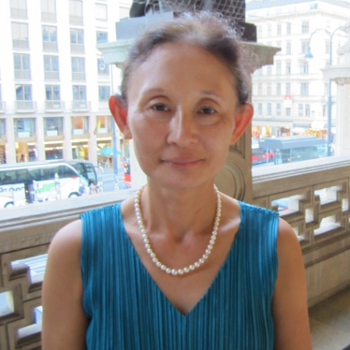Directors Moshe Leiser and Patrice Caurier decided to transport Pique Dame, Tchaikovsky’s dark drama of obsession and death in Imperial Russia, to the composer’s own time, around the late 19th century. They take liberties with both the characters and the action. Liza is not a young noblewoman torn between her aristocratic fiancé and a wild, gambling soldier, but is a prostitute abused by both men. Hermann does not accidentally cause Liza’s grandmother – here a brothel madam – to die of fright; he actually causes her death by his own hands. He also murders Liza in her bathtub. Prince Yeletsky is a cruel monster who has bondage sex with Liza while singing of his undying love for her and it is he who hands Hermann a pistol for the latter’s suicide. Liza and her cousin (and fellow prostitute) Polina are more than friends. They also perform in the Intermezzo as Chloe and Daphnis as an entertainment for the brothel patrons. Prostitutes make fun of their madam as they dress her up as “Catherine the Great”.
The long stage of the Festival House in Baden-Baden is fully utilised in Christian Fenouillat’s two-storey set. When the curtain opens, we see the bottom portion of stage, with a low ceiling, is a drab box with a long table where Hermann and other soldiers as well as the gentlemen sit and drink and gamble. This box transforms into a large brothel parlour with chairs and a piano. A spiral staircase on the side leads up to the second level: Liza and her grandmother’s rooms. As Hermann loses his grip on reality in a delirious dream sequence, his bed is placed in a crooked box on stage, where he is visited by the old lady. The stagecraft is impressive; costumes are simple and crisp, lighting is evocative and effective, stage movements are exceptionally well choreographed and executed. Some details of the rewriting by the two directors may seem excessive, but they often make sense in the context of the retelling – interesting and provocative Regietheater.
The reinterpretation may not have been as acceptable or even enjoyable were the musical performances not of such top quality, astounding and unforgettable. Kirill Petrenko, in his typical fashion, focused on bringing out subtleties and nuances in Tchaikovsky's score with the Berlin Philharmonic, rather than going for exaggerated tempi and dynamics. Under his assured baton, the music just flowed, melodies smooth and endless, pianissimos heart-wrenching and beautiful, strings lush and propelling, and occasional brass and percussion outbursts thrilling and moving. Petrenko’s attention to his singers was remarkable, as he controlled the volume so as not to overwhelm them but rather make them prime movers of the music, with orchestra accompanying rather than leading. His cueing was always clear and consistent; towards the end as Hermann sings “Tri karty” (three cards), I actually saw Petrenko signalling him by holding up three fingers!
Strong singing was another delightful highlight of the performance. Armenian tenor Arsen Soghomonyan, who switched from baritone several years ago, brought out Hermann’s torment and agony with his warm but strong voice full of exciting dynamics. He never seemed to force his voice; he just opened his mouth, as if to have a conversation, and a torrent of pleasant yet powerful phrases emerged; very natural singing. His high notes sometimes went a bit awry, but he succeeded in communicating the inner voice of the character as a complex being. Elena Stikhina, stepping in with about a week’s notice, was a magnificent Liza, both in voice and acting. What was most striking was how even the timbre of her voice was across the registers. Low chest notes were soft and creamy but always audible, high notes were never shrill but clear, gleaming and free of vibrato. She expressed the heroine’s conflicted loyalties with superb control of her vocal and stage presence; a triumph.
The two strong leads were supported by splendid singers to ensure the performance’s success. Veteran Doris Stoffel sang the Countess/madam with elegance, her voice still expressive and soulful. As Polina, Aigul Akhmetshina’s opulent mezzo complemented Stikhina’s soprano in their thrilling duets; her solo moments were also memorable. Boris Pinkhasovich’s forceful, somewhat blunt singing matched the directors’ characterisation of the malevolent Yeletsky well. As Tomsky, Vladislav Sulimsky offered a sympathetic and characterful portrayal, and Yevgeny Asimov as Chekalinsky and Anatoli Sivko as Surin rounded out a strong, mostly Russian ensemble.
Petrenko, the orchestra, soloists and the splendid Slovak Philharmonic Choir demonstrated how an alternative and unconventional production can be convincing and exciting when it is embodied by committed musical performances. I will remember this Pique Dame as a universal tragedy of self-destructive characters caught in impossible and cruel circumstances.




